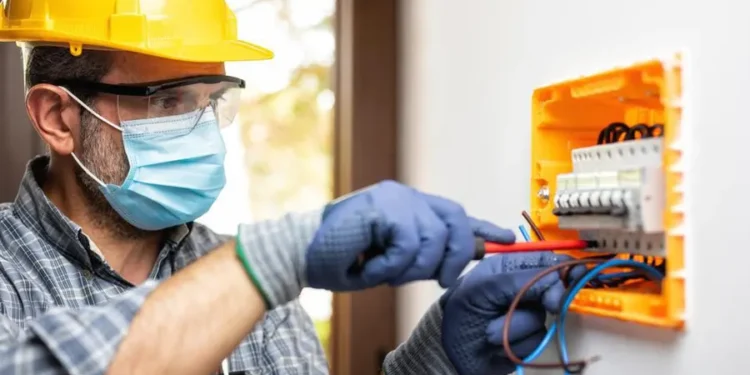When it comes to your home’s electrical system, there’s no room for shortcuts. Whether you’re installing new lighting, upgrading your circuit panel, or fixing a faulty outlet, hiring a reliable and safe electrician is crucial. A skilled electrician ensures not just functionality, but safety for you and your family. In this guide, we’ll walk you through everything you need to know to find the right professional for the job—from what qualifications to look for, to red flags to avoid.
Check out the Responsibilities of House Electricians.
Why Hiring the Right Electrician Matters
Electricity is a powerful but dangerous force when handled improperly. Faulty wiring, overloaded circuits, and DIY mistakes can all lead to house fires, electrical shocks, or expensive damages. That’s why hiring a licensed, experienced, and safety-conscious electrician isn’t just a preference—it’s a necessity. The right electrician will follow local building codes, use quality materials, and ensure the longevity and safety of your home’s electrical infrastructure. In short, they bring peace of mind that your home is in good hands.
Start with Research: Licensing, Insurance, and Certification
The first and most critical step in hiring an electrician is verifying their credentials. A licensed electrician has passed regulatory exams, completed formal education or apprenticeship programs, and meets all legal requirements in your state or region. This means they know how to perform the job safely and effectively.
In addition to licensing, always ask if the electrician carries liability insurance and worker’s compensation. Liability insurance protects your property in case of damage, while worker’s compensation covers the electrician if they’re injured on the job. Without these, you could be left footing the bill if something goes wrong. Also, check if they’re certified by reputable organizations such as the National Electrical Contractors Association (NECA) or local trade associations—these credentials are often a sign of higher professionalism and ongoing training.
Read Reviews and Ask for Recommendations
In today’s digital age, reading reviews is a must. Start with platforms like Google, Yelp, or even neighborhood apps like Nextdoor. Look for consistent praise regarding punctuality, professionalism, and the quality of work. Be wary of contractors with a long trail of negative reviews, especially those related to unfinished jobs or hidden charges.
Beyond online reviews, don’t underestimate the value of word-of-mouth recommendations. Ask friends, family, or coworkers if they’ve recently hired an electrician and what their experience was like. Personal referrals often lead you to hidden gems—trustworthy professionals who may not have flashy websites but consistently deliver excellent service.

Experience Counts: Choose Specialists for Your Needs
Electrical work isn’t one-size-fits-all. Some electricians specialize in residential work, while others focus on commercial or industrial jobs. Within residential services, there are even further specializations such as smart home wiring, panel upgrades, or landscape lighting.
Make sure the electrician you hire has relevant experience for your particular needs. For instance, if you’re installing recessed lighting throughout your home, hire someone with a track record of lighting installations, not just general repairs. Ask how many similar jobs they’ve done and request photos of previous work if available. Experienced electricians are often faster, more efficient, and better at troubleshooting unexpected issues.
Request Multiple Quotes and Compare Value
It’s tempting to go with the lowest quote, especially if you’re on a tight budget, but this can be a costly mistake in the long run. Instead of choosing based solely on price, compare the scope of work, timeline, and warranty offered in each estimate. A higher quote might include better quality materials, faster turnaround, or a longer warranty, which can save you money down the line.
When reviewing quotes, make sure everything is detailed in writing—labor costs, materials, projected hours, and any guarantees. Avoid contractors who give vague or verbal-only estimates. Transparency is a key sign of professionalism.
Communication and Professionalism Matter
A great electrician isn’t just someone who knows wires and circuits—they’re also good communicators. Pay attention to how they respond to your inquiries. Are they polite, prompt, and thorough in their explanations? Do they listen to your concerns and answer questions clearly?
Professionalism extends beyond communication. A trustworthy electrician will show up on time, dress appropriately for the job, and treat your home with respect—cleaning up after the work is done. These might seem like small things, but they reflect the kind of service and attention to detail you can expect.
Watch Out for Red Flags
Unfortunately, not all electricians are created equal. Be cautious of anyone who pressures you into immediate decisions or offers “too good to be true” pricing. Other red flags include:
- Lack of proper licensing or insurance
- Hesitation to provide references or reviews
- Vague or verbal-only estimates
- Unwillingness to sign a contract
- Poor communication or missed appointments
If something feels off, trust your instincts. It’s better to keep searching than to end up with an unreliable contractor.
Don’t Skip the Contract and Warranty
Before any work begins, get everything in writing. A formal contract should outline the full scope of work, payment schedule, estimated completion time, and warranty information. This protects both you and the electrician and sets clear expectations for the project.
A warranty is also a sign that the electrician stands behind their work. Most reputable electricians offer a guarantee for both labor and materials. If something goes wrong after the job is done, you won’t have to pay out of pocket for repairs.
Trust the Process and Follow Up
Once you’ve hired the right electrician and the work begins, stay involved. Ask questions if you’re unsure about something, and don’t be afraid to request updates. A good electrician will appreciate a homeowner who is engaged and cares about the quality of the work being done.
After the job is complete, inspect the work thoroughly. If everything looks good, make the final payment as agreed. Then take a few minutes to leave an honest review—good or bad. Your feedback can help the next homeowner make an informed decision.
Conclusion
Choosing a reliable and safe electrician for your home isn’t just about convenience—it’s about protecting your property, your investment, and the people you care about most. By doing your homework, verifying credentials, reading reviews, and trusting your instincts, you can find a professional who delivers high-quality, safe, and dependable service. With the right electrician on your side, you can flip the switch on stress and light up your home with confidence.







